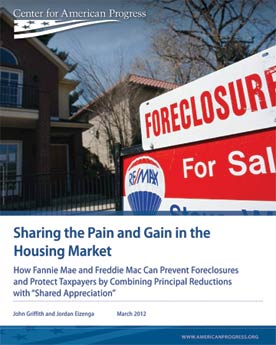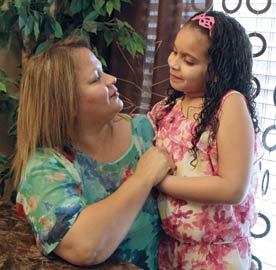From its title, Sharing the Pain and Gain sounds like a helpful contribution to the policy debate underway about principal reduction modifications for underwater homeowners. But the piece’s suggested course of action — that FHFA set up a limited pilot program to test the idea — throws an anchor instead of a life raft to the hundreds of thousands of drowning families who desperately need help, now.
While Sharing the Pain strongly supports principal reduction in theory, the proffered pilot program effectively sets up (and could be read to actually support) FHFA Acting Director Edward DeMarco’s April speech at the Brookings Institution where he made only a very limited retreat from his hard line position against principal “forgiveness.”
In its favor, Sharing the Pain touts the success of Ocwen’s Shared Appreciation Modification. (See Shelterforce‘s interview with Ocwen CEO Ron Faris.) Ocwen, a major subprime servicer, will write down underwater mortgages to 97 percent of the home’s actual value. To date the SAM program has a remarkably low redefault rate and Ocwen is very clear that it is saving investors’ money.
Sharing the Pain is intended for the “civilian” reader. It’s informal in tone, brief enough to digest in one sitting, and includes a good collection of the foundational research and data supporting the community side of the debt-overhang policy debates.
But as advocacy, Sharing the Pain falls far short. The assertions supporting principal reduction are qualified and unnecessarily weak, such as “for deeply underwater loans, a borrower’s equity position meaningfully impacts their likelihood of default.” Meaningfully impacts? Diminished equity is a predictor of loan default and has been for generations. This qualified and roundabout assertion concedes ground long since hard won in the larger policy debate.
Viewed from the neighborhood level, the proposal to set up a (very limited) FHFA pilot program is just another long-winded way of saying “no” to principal reduction. By the time the pilot is finally up and running and then, later still, evaluated, hundreds of thousands more of our underwater neighbors will lose their homes to the Fannie-Freddie foreclosure juggernaut.
By now it should be clear that the final human and economic toll from this catastrophe is a function of time. Pilots take time. Exactly how many more families must lose their homes because they were helplessly shackled to an upside down mortgage? Suggesting a limited pilot program postpones a rational response to this horrifically destructive meltdown. And that is a Bad Idea.





Comments